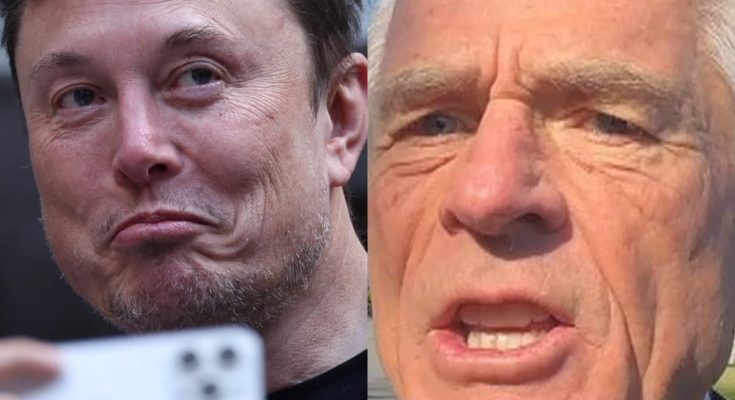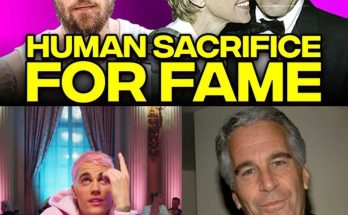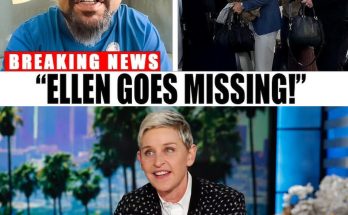The feud between Tesla CEO Elon Musk and top White House trade adviser Peter Navarro has escalated into a full-blown political spectacle — with personal insults flying, reputations bruised, and the Trump administration stuck in the middle. While the drama is dominating headlines, it reflects a far deeper division within the administration: the battle over the future of U.S. trade policy.From Musk’s jabs at Navarro’s Ivy League background to Navarro’s blunt dismissal of Musk as merely “a car assembler,” the fight has become impossible to ignore. And while media and lawmakers react, the Trump White House has decided to stand back and let it burn.“Boys will be boys, and we will let their public sparring continue,” said White House Press Secretary Karoline Leavitt on Tuesday, offering a rare light-hearted remark amid a serious internal clash.The public feud reignited after Musk took a jab at Navarro’s academic pedigree. Replying to a user on X (formerly Twitter) who praised Navarro’s Harvard PhD in economics, Musk didn’t hold back: “A PhD in Econ from Harvard is a bad thing, not a good thing. It results in having more ego than brains.”The insult wasn’t just personal — it directly questioned Navarro’s authority as the architect of Trump’s aggressive trade policy. Navarro, a longtime economic nationalist, has played a central role in designing and defending the administration’s sweeping tariff expansions, which target imports from dozens of countries.Musk, whose companies like Tesla depend on international supply chains, has been an increasingly vocal critic of these tariffs.Navarro, never one to shy away from a fight, responded swiftly during a Monday interview on CNBC. His target: Musk’s manufacturing credentials.“Elon is a car manufacturer, but he’s not a car manufacturer. He’s a car assembler,” Navarro said. “He’s a car person. That’s what he does — and he wants the cheap foreign parts.”The dig wasn’t subtle. It painted Musk not as a visionary innovator, but as a businessman who cobbles together foreign parts and benefits from globalism — the very model Navarro and Trump have long opposed.The retaliation came fast. Musk took to X and launched a new barrage of insults in response to Navarro’s comments: “What he says here is demonstrably false. Tesla has the most American-made cars. Navarro is dumber than a sack of bricks.”Then, with his signature sarcasm, Musk added: “Apologies to the bricks. That comparison was so unfair… to bricks.”The post quickly went viral, turning the policy disagreement into a meme war and making headlines far beyond Washington.While tensions between Musk and Navarro reach new highs, the Trump administration seems to be watching from the sidelines — popcorn in hand. “These are obviously two individuals who have very different views on trade and on tariffs,” Press Secretary Karoline Leavitt said. “Boys will be boys.”But sources inside the administration say the feud has not gone unnoticed. Though Trump has so far avoided commenting directly, insiders suggest the President remains firmly behind Navarro, who continues to carry out his trade agenda with full executive backing.“Elon’s influence has faded,” one senior White House official said off the record. “Navarro is aligned with the President’s vision. Musk clearly isn’t.”On Capitol Hill, the Musk–Navarro drama drew a sharp rebuke from Senate Minority Leader Chuck Schumer, who used it to criticize the internal coherence of the Trump administration.“The chaos within the Trump administration was shown a few minutes ago when Elon Musk called Peter Navarro, the chief architect of these tariffs, a moron,” Schumer said on the Senate floor.“Their plan is so crazy, so controversial, that they can’t even keep their own economic voices on the same page — they’re throwing bricks at each other, literally.”Though the insults make headlines, the core disagreement is deadly serious. Musk and Navarro represent two fundamentally opposing views of how America should engage with the global economy.Navarro sees tariffs as a patriotic tool to restore domestic manufacturing, protect jobs, and strengthen national security. Musk sees them as harmful taxes that disrupt supply chains, increase costs for consumers, and hinder innovation.Tesla, while based in the U.S., depends on parts sourced globally — including from countries now facing heavy tariffs. With billions at stake, Musk’s criticism is about more than ego — it’s about business survival.“We build here. We employ here. And we innovate here,” Musk wrote in defense of Tesla’s American operations. “Navarro’s narrative is wrong — and dangerous.”Musk was once considered an informal adviser to Trump, participating in early administration councils and supporting deregulation and infrastructure reform. But as Trump’s trade war escalated in his second term, Musk increasingly found himself on the outside.Today, he’s gone from whispering in the President’s ear to being mocked by his most loyal trade lieutenant. “Navarro is winning this battle,” said Dr. Hannah Park, a political economist at Georgetown. “Trump trusts him. Musk’s open defiance has put him out of the inner circle.”Despite the memes and brick jokes, analysts warn that the public spat highlights deeper fractures in America’s economic strategy.“This isn’t just Musk vs. Navarro,” said policy analyst Brandon Miles. “It’s tech vs. tariffs. Globalism vs. nationalism. And the stakes are massive.”With new tariffs coming into effect and other business leaders quietly expressing concern, Musk’s war of words may be the loudest — but it’s far from the only sign of discontent.Whether Musk and Navarro bury the hatchet remains to be seen. But in a White House where bold personalities thrive, and loyalty is everything, Musk’s sarcasm may have sealed his fate.The White House may be shrugging publicly — but behind the scenes, it’s clear: this isn’t just a fight between two strong personalities.It’s a fight for the soul of America’s economic future.
BREAKING NEWS! It’s Musk vs. Navarro in a full-blown flame war, and the White House is watching like it’s a Netflix drama — with lighter fluid.

Block 1


